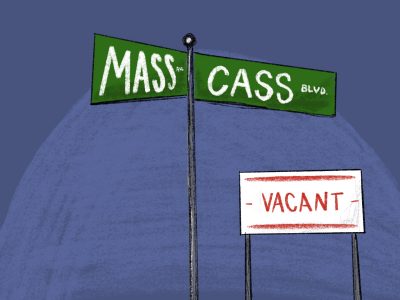“Mass. and Cass,” the large homeless encampment around the intersection of Massachusetts Avenue and Melnea Cass Boulevard and the beating heart of the regional opioid epidemic, has long been a thorn in the side of Boston policy makers.
Last Wednesday, in the City’s most recent attempt to address the issue, Mayor Michelle Wu signed an ordinance allowing the Boston Police Department to clear the encampment of tents and other temporary structures, effectively wiping Mass. and Cass off the map.

According to 7 News Boston, as of Wednesday, of the roughly 80 people who had been encamped around Mass. and Cass, 52 had already been moved into shelters, 25 had made shelter arrangements, nine people had been reunited with their families and seven people were still awaiting arrangements.
According to WBUR, in the process of clearing the encampment, over two tons of material were collected, including many possessions of the homeless people who had failed to vacate the premises in time. People were also forced to be separated from their pets. Several homeless people expressed to WBUR their displeasure with the ordinance, saying they felt discarded and betrayed by the city.
“We’re still planning once a week to all congregate here … just to smack ’em in the face,” Iyokomi Ortiz-Simmon, another former resident of Mass. and Cass, told WBUR.
And if history has any precedent, she probably means it.
Boston has tried time and time again to excise Mass. and Cass from its streets, as overtime the area has become a hotbed for drug deals, violence and sex trafficking, yet it’s always only been a matter time until homeless people once again congregated around the area.
Homeless encampments pop up in any place where homelessness rates are high enough to sustain them. According to a paper by the U.S. Department of Housing and Urban Development, homeless encampments form to offer a sense of community and security and fulfill the desire for autonomy and privacy of homeless people.
It stands to reason then that until the City adopts a policy approach aimed at targeting the underlying issues of the homelessness, substance abuse and mental health crises in Mass. and Cass, attempts to negate its existence will be done in vain.
However, it’s also easy to sympathize with why those who are housed in the neighborhood surrounding Mass. and Cass — especially those who have families with young children — would not want to live in such close proximity to a crime-ridden area.
Therefore, Mass. and Cass represent a tragic yet fascinating moral dilemma for Bostonians, one which cuts to the core of our values and priorities as a city.
Research has repeatedly shown that sweeping homeless encampments only decreases visibility of homelessness and only exacerbates the root causes of its existence. Yet, is it right to ask residents to sit idly by as their neighborhood descends into an open air drug and sex market?
Both mutually exclusive perspectives, albeit completely fair and reasonable, make the situation even more polarizing. In reality this is a false dichotomy, there need be no antagonism between the housed and unhoused when both are victims of the same systemic failures.
Wu campaigned as Boston’s first truly progressive mayor. Following in the footsteps of her predecessor and just trying to brush Mass. and Cass under the rug has tarnished that reputation.
The only way to keep Mass. and Cass from coming back or another encampment showing up somewhere else in the city — without resorting to force, that is — would be sweeping policies costing lots of taxpayer money. Which is precisely what’s needed.
Except, that fact is not very popular among constituents. One, because they’re also struggling to get by, but also because of classist prejudices our culture holds toward homeless people.
The traditional values of self-reliance and rugged individualism, epitomized in oxymoronic phrases like “pull yourself up by your bootstraps” or “self-made man,” intentionally distract from systemic problems with definite causes, effects and solutions.
If you view socioeconomic status as solely someone’s personal responsibility, in your eyes poverty becomes a moral failing or, even worse, a reflection of someone’s worth.
Demystifying the myth of meritocracy allows us to see that we are not powerless in the face of the homelessness, substance abuse and mental health crises.
People have not become lazier, weaker-willed or crazier over the decades. For economic and ideological reasons, these crises have collectively been allowed to spiral out of control, but we could also put them back in the box if the collective will existed to do so.
Taking away the only home that homeless people have is easy and popular because constituents who have been conditioned to view homeless people as inherently less than themselves.
Creating clean injection sites, providing inexpensive substance abuse and mental health counseling and building more low-income housing among other efforts have been tried and proven to decrease homelessness.
Thinking about the bigger picture, policies that create a downward redistribution of wealth, like a progressive income tax or raised minimum wage, will decrease income inequality and address poverty.
However taking such steps would ask of us to extend our empathy toward those who society says are most undeserving of it. The ones on the streets, open hands reaching out, who you hurriedly walk past trying to not to acknowledge their existence.
Wu’s approach to Mass. and Cass this time around was admittedly more humane than some of the City’s past actions, and her successful effort to find shelter for most of the relocated is highly commendable. But she’s ultimately done the same thing as Boston has done over and over again and expected a different result — the definition of insanity.
This Editorial was written by Opinion Co-Editor Nathan Metcalf














































































































